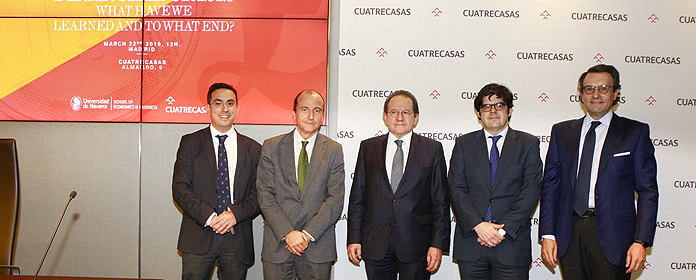19_03_25_ECO_cuatrecasas
Jesús Saurina, director general of the Bank of Spain, urges to complete the financial regulation apparatus
Professionals from the banking sector participate in workshop on the tenth anniversary of the financial crisis organized by the University of Navarra and Cuatrecasas.

"We must complete the regulatory apparatus as soon as possible to be prepared in case better times do not come". This was stated by the director general for financial stability, regulation and resolution of the Bank of Spain, Jesús Saurina, during his speech at the roundtable entitled 'Ten years after the crisis, what have we learned? organized by the Master's Degree in Banking and Financial Regulation University of Navarra and signature Cuatrecasas.
During the crisis, authorities were forced to bail out banks whose failure could have meant the collapse of the financial system, Saurina explained. "Part of the international measures to reduce the problem of large banks focused on the development of effective resolution mechanisms," he said. In this sense, the executive affirmed that the financial crisis generated a paradigm shift, "we went from internal recapitalization bailouts to public bailouts".
Likewise, the Bank of Spain's executive stated that the recent creation of the Macroprudential Authority committee for Financial Stability (AMCESFI) is a big step in the right direction. "The AMCESFI aims to contribute to the stability of the financial system as a whole through the identification, prevention and mitigation of sources of systemic risks and has the ability to issue warning opinions and recommendations to all members," he said.
Similarly, the former vice-president of the European Central Bank, Vítor Constâncio, believes that "the crisis caused a significant increase in risk aversion and a generalized preference for security". Something that, in his opinion, has left deep scars not only on the productive capacity of economies but also on the behavior of economic agents in relation to risk. "The preference for safety is in part manager due to excess demand for safe assets, which depresses real interest rates and narrows bank margins," he explained.
For his part, Cuatrecasas partner Fernando Mínguez believes that the crisis was not so much due to a failure in regulation as to a simple lack of compliance with that same regulation or, at least, compliance with the law in a broader sense. Mínguez points out that the creation of new regulation must respond to clear evidence of the deficiencies or inadequacy of current or previous regulation.
On the other hand, the senior advisor of Álvarez & Marsal and vice-president of La Finca, Jorge Morán, believes that this is the right time for the concentration of the banking market. In that sense, he assured that the banks that survive the concentration will have to invest in technology from data to be able to have a better customer knowledge . He also believes that the big losers in this crisis were the banks, since, in his opinion, they have become unattractive to investors and future employees. "The new generations prefer to work in supervisory bodies rather than in banks," said Morán.

